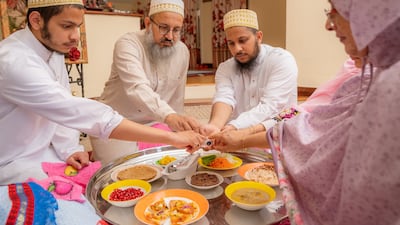In her home in Dubai, Tasneem Rangoonwala takes the reins in the kitchen. “As a homemaker, I understand the needs of my family, and so I have a very controlled cooking method,” she tells The National.
As the family sit around a big steel plate, called thal for dinner, an unspoken rule takes effect: no one will take more food than they can eat, and no plate will be left unfinished. What might seem like simple dinnertime etiquette is, for this family, a deeply ingrained way of life.
Rangoonwala, originally from Mumbai, is part of the Dawoodi Bohra community, a Muslim sect with more than a million members across the globe. Sizeable groups of Bohras live in India, with diasporic congregations in Europe, North America, Australia and the Middle East.
Reducing food waste is not a response to zero-waste movements and environmental campaigns. For this tight-knit community, it is a practice rooted in faith, culture and respect for the food that sustains them.
On this year’s International Day of Awareness for Food Loss and Waste, the Dawoodi Bohras are an example of how food sustainability can be seamlessly woven into everyday life. Tradition, it seems, might hold the key to a greener, more responsible future.
Grounded in faith
The concept of “zero-waste” living may be a modern term, but for the Dawoodi Bohras, it is an ancient philosophy that underpins their relationship with nature, as well as their faith.
“We have always been taught that if you waste a grain, that grain is not coming to you tomorrow,” says Kinana Jamaluddin, the UAE representative of Sultan al Bohra Syedna Mufaddal Saifuddin, global leader of the Dawoodi Bohras.
“We have a lot of historical examples from our scriptures pertaining to the non-wastage of food,” he adds, explaining how Bohra families over the years have naturally built habits that prevent food waste. “Even for our leaders, in their private homes, every crumb is respected.”
This principle is not only found in their daily meals, but also in everything the community does, from grand communal feasts to intimate family dinners.

“The concept is about getting together and sharing among ourselves,” adds Jamaluddin. “If we eat together, it becomes a social event where we invest time in getting to know each other. It's sharing of food and sharing of ideas at the same time – that's what we are promoting here.
“At home, especially during dinners, the whole family, from grandparents to children, sits together and have a good conversation and connection. That's always been part of our ethos as a community.”
Rangoonwala says that not wasting food is second nature to her as she grew up in a Bohra household. “This concept is so ingrained in us that we become mindful of eating at home and mindful when we're eating outside,” she explains.
“When we go to an all-you-can-eat buffet, for example, we are very conscious of how much we take. My son comes home from school every day with his lunch box empty. I don't even have to tell him that he needs to finish his food; he just knows.”
The Dana committee
Enforcing a zero-waste policy can be a challenge at big events. But the Bohras have been doing it for years and have perfected a straightforward mechanism to ensure no food is wasted – even when leftovers are sometimes inevitable in such cases.
“RSVPing is very important in our community gatherings, mostly because we want to track the food that is required for however many attendees,” says Jamaluddin. “Caterers control the amount of food that is served, sometimes even up to the calorie count.”
This does not mean that food is restricted in any way, he explains. When someone wants more, they can have more, but the onus is on them need to ensure everything is finished.
In 2018, the Dawoodi Bohra community was recognised by the Golden Book of World Records, an Indian organisation that acknowledges extraordinary achievements, for organising the largest zero-waste religious event in Indore. It was attended by about 150,000 people.
The group's worldwide Dana committee of more than 9,000 volunteers helps enforce zero-waste policies at such events. They help with portion control and propagating constant reminders to make sure that Bohras who attend communal gatherings are mindful of their food consumption.

The group repacks and donates untouched leftovers to underserved communities. In the UAE, the Dawoodi Bohras work with groups such as the Emirates Red Crescent to distribute the repurposed excesses.
Tasty chikoli
This culture of mindfulness naturally extends to Bohra cuisine. Leftovers at home, for instance, are always carefully stored and repurposed, sometimes in entirely new dishes such as curries, soups or snacks.
Chikoli, a hearty one-pot dish made from leftover yoghurt or buttermilk, spiced and simmered with excess roti from previous meals, demonstrates the community's resourcefulness. Bohra families have learnt to utilise every ingredient in their pantry, even items sometimes casually left to expire in kitchen cupboards.
“Once I called my wife to say the parathas she made were really good and then she told me it's actually a mix of our past few meals,” says Murtaza Rasheed, another member of the Dawoodi Bohra community in Dubai. “She had ground them, added flour and made parathas out of them.”
For Sharrah Kapadia, it's been “common practice to talk to my children about their food. I ask them if they are eating rice for dinner, for example, and if yes, I'll cook their portion; if no, I won't. You just don't assume that everybody's going to eat everything,” she adds.
These discussions inform Kapadia's grocery runs. She only buys food likely to be consumed in its totality before the next shopping day just as her mum did, and her mother before that, proving we could all take a leaf out of the book of the Dawoodi Bohra sect: that sometimes, the answers to modern problems lie in the wisdom of the past.

